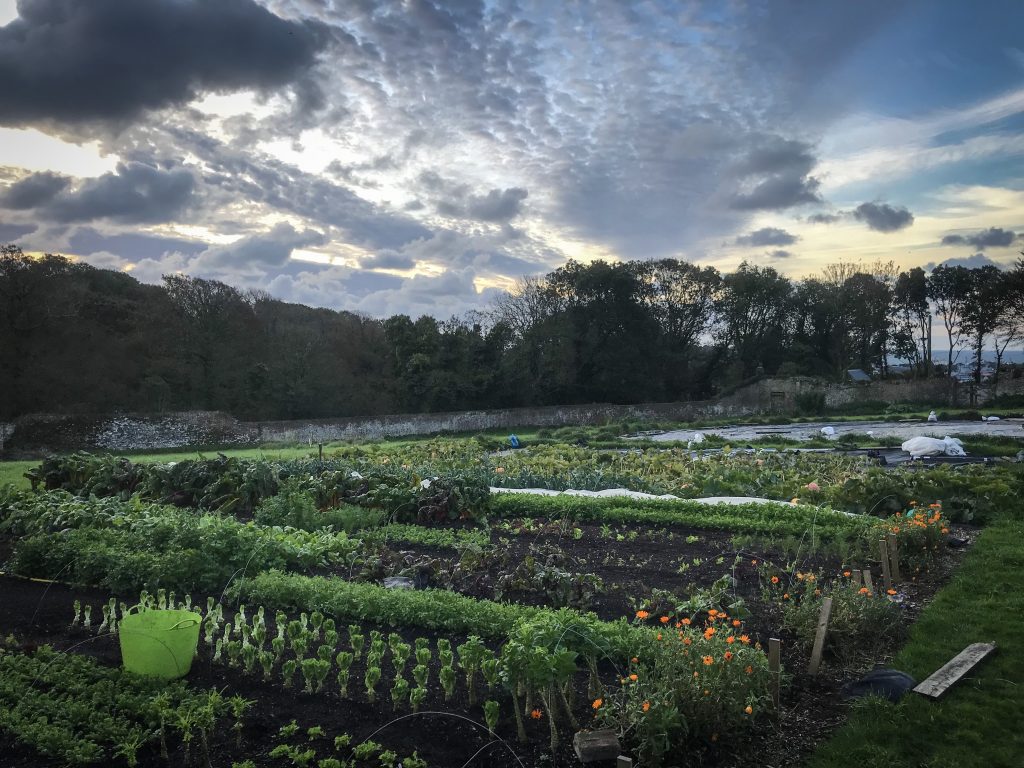 View over Soul Farm veg plots. Credit: Soul Farm.
View over Soul Farm veg plots. Credit: Soul Farm.

Soul Farm: A CSA farmer-focused supply chain case study
Soul Farm is a 5-acre market garden, growing seasonal vegetables across two sites in Flushing and Falmouth, Cornwall. Established in 2019, the vegetables are grown in a Georgian walled garden that hasn’t been producing food on a large scale since the 1960s. Laurence and Adele Jarrett-Kerr and Ian Brydon, are now using small-scale regenerative principles such as no-dig techniques to improve the soil and provide healthy food for the local community. Last year, they sold to restaurants as well as running a Community Supported Agriculture (CSA) scheme.
“Our produce is grown with soul under Cornish sun, and grown in soil using organic principles”
Laurence and Adele Jarrett-Kerr, Soul Farm
As a CSA, we are looking to connect community and growers, so that you know what you are getting. Labels like organic are necessarily useful for us, as the customer knows exactly where their food has come from. Trust is built up and customers can communicate directly with the farm as members, giving valuable feedback on the produce.
For more info visit Soul Farm's website
During the 1940s, the greenhouse sustained bomb damage and is now being repaired, with other areas being turned into no-dig vegetable plots. The micro farm means that we do not need motorization. Increased diversity and soil biology means more fertility, healthier and tastier plants, and no need for any GMOs and pesticides. More organic matter in the soil means more water retention and robustness to unseasonal dry spells. These techniques can’t necessarily be achieved on an industrial scale, which is why they are not really being practiced. The use of machinery demands that farms become bigger, with equipment size taking up space. The bigger the farm, the wider the market needs to be and the pressure this puts on the environment. There are practices like no-dig and no-till which help build soil, increase fertility and manage weed and insect pressures, but they rarely practiced on a large scale.
We started off thinking we’d do some CSA, because we had always wanted to be a farm for the community, but we thought that supplying restaurants would fund this element. In reality, we saw that there was a real need and people wanted to know where there food was coming from. We were also increasingly coming across people in the area who couldn’t afford veg, let along organic, so we decided to operate on a sliding payment scale. Those who join the higher income brackets will help us fund shares for people experiencing food insecurity in Cornwall.
Soul Farm, Cornwall:
- 5-acre CSA regenerative farm working with nature and climate.
- We have created 5 jobs from just 5-acres of land.
- Supply through a CSA scheme, restaurants and at a farmers’ market
- Co-founder of The Food Barn in Tregew, Cornwall.
- Use no-dig methods which has helped us build soil health.
- 24% of our members are funded through our solidarity scheme.
- We run a volunteer programme aimed at connecting people to the land and learn new skills.
- Use of interplanting is helping us increase biodiversity.
If you are thinking of becoming a CSA based on agroecological principles, we recommend that you:
Think about inclusivity on every level of your business, from leadership to community members. Every enterprise gains strength from diversity of perspective and the time is now to connect people with agroecologically grown food.
Once you have decided to start your farm, go all in. Minimise the time you spend with growing as a side project. Success requires more of your attention.
Looking forward, our vision it to integrate more polytunnels in the next few years and maximise our growing space. We are also working towards deepening our connections with our community, especially those through our solidarity scheme. Food justice is at the heart of what we are doing. Sustainably grown food should be available to everyone, regardless of income or background. We also want to help others get into farming and will be looking at launching an internship scheme in the near future.
We want to see policy change to allow growers to live on smaller plots of land; this would be a game changer. Ultimately, universal basic income would allow more people to take the leap into farming and radically transform the sector.
We have learned a lot about growing from Charles Dowding and J.M. Fortier. We have also been hugely inspired by Leah Penniman and Maggy Cheney in terms of food justice and social connection.
Soul Farm website and Instagram.
Download the case study here.
Find out more about the Community Supported Agriculture movement.
Find more information on The Food Barn.
Sustainable Farming Campaign: Pushing for the integration of sustainable farming into local, regional and national government policies.
Sustain
The Green House
244-254 Cambridge Heath Road
London E2 9DA
020 3559 6777
sustain@sustainweb.org
Sustain advocates food and agriculture policies and practices that enhance the health and welfare of people and animals, improve the working and living environment, promote equity and enrich society and culture.
© Sustain 2026
Registered charity (no. 1018643)
Data privacy & cookies
Icons by Icons8